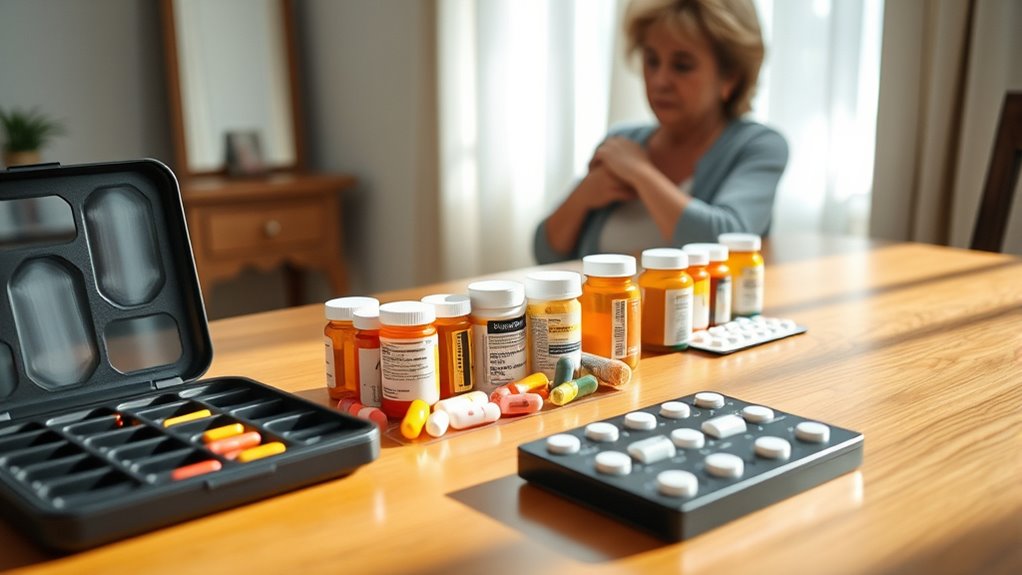To manage multiple prescriptions effectively, keep medications organized in labeled containers and create a clear schedule indicating dose times and special instructions. Communicate regularly with healthcare providers and pharmacists about your loved one’s medications to prevent interactions and errors. Use technology like apps and reminders to stay on track with refills and doses. Staying organized and informed is key—continue exploring strategies that can make medication management safer and simpler for both of you.
Key Takeaways
- Develop a clear medication schedule with dosing times and instructions to avoid missed or double doses.
- Keep prescriptions organized in labeled containers and regularly review labels for accuracy.
- Communicate all medications and updates with healthcare providers and pharmacists to prevent interactions.
- Use digital tools and reminders to track refills, dosing times, and medication changes.
- Maintain open communication with the care team and regularly review medication routines for safety and effectiveness.

Are you overwhelmed by having to manage multiple prescriptions? It’s a common feeling among caregivers, but taking a strategic approach can make it much more manageable. One of your top priorities should be guaranteeing medication safety. This means paying close attention to how and when medications are taken, avoiding harmful interactions, and sticking to the prescribed dosages. To do this effectively, you need to stay organized and vigilant. Keep all prescriptions in one place, preferably in a labeled medication organizer or a dedicated folder. Regularly review the labels to confirm you’re giving the right medication at the right time. It’s also helpful to create a medication schedule or chart, highlighting dosing times and any special instructions. This not only prevents missed doses but also reduces the risk of giving the wrong medication.
Prescription coordination plays a essential role in managing multiple prescriptions. Coordinating with healthcare providers ensures that all medications are compatible and necessary. Make a habit of updating your healthcare team about all the medications your loved one is taking. This helps prevent drug interactions and unnecessary duplicate therapies. When you receive new prescriptions, clarify the purpose, dosage, and potential side effects. If possible, ask your healthcare provider or pharmacist to review all medications together to identify any problematic overlaps. Some pharmacies offer medication synchronization services, where they align refill dates so you can pick up all prescriptions at once. This reduces trips to the pharmacy and minimizes the risk of missing refills or taking expired medications.
Using technology can also streamline prescription coordination. Many pharmacies now offer online portals where you can track refills, receive medication alerts, and communicate directly with pharmacists. Setting reminders on your phone or using medication management apps can help you stay on top of dosing schedules and refill dates. Don’t hesitate to ask your pharmacist questions about each medication’s interactions or side effects; their expertise is invaluable in maintaining safety. Remember, clear communication with healthcare providers and pharmacists helps guarantee your loved one’s medications are managed safely and effectively.
Ultimately, managing multiple prescriptions requires ongoing effort and organization, but with attention to medication safety and proactive prescription coordination, you can reduce stress and improve health outcomes. By staying informed, using available tools, and maintaining open lines of communication, you’re providing a essential layer of protection and support. Your diligence makes a significant difference in ensuring your loved one’s medication regimen is safe, effective, and tailored to their needs.
Frequently Asked Questions
How Can I Prevent Medication Interactions Between Prescriptions?
To prevent drug interactions and guarantee medication compatibility, always keep a detailed list of all prescriptions, including dosages and times. Consult your healthcare provider or pharmacist before adding new medications, as they can check for potential interactions. Never mix medications without professional guidance. Regularly review prescribed drugs with your healthcare team, and report any side effects promptly. Staying vigilant helps protect your loved one from harmful drug interactions.
What Should I Do if a Dose Is Missed?
If you miss a dose, don’t panic. Check the medication instructions for timing adjustments, as some doses can be taken later or skipped without issues. Contact your healthcare provider if you’re unsure. Use clear communication strategies to keep track of doses and inform them about missed ones. Remember, timely action helps guarantee medication effectiveness and safety, so stay vigilant and proactive in managing your loved one’s prescriptions.
How Can I Organize Medications for Easier Management?
Imagine a colorful pill organizer as your medication map, guiding you through each dose. Use a weekly pill organizer to sort pills by day and time, creating a clear medication schedule. This visual system reduces confusion, helps you stay on track, and guarantees your loved one takes the right medication at the right moment. Keep the organizer in a consistent, visible spot to make managing multiple prescriptions easier and stress-free.
When Is It Necessary to Consult a Pharmacist?
You should consult a pharmacist whenever you’re unsure about medication counseling or need prescription updates. If your loved one experiences side effects, has questions about drug interactions, or you notice changes in their condition, it’s essential to seek professional advice. Pharmacists can clarify instructions, guarantee proper medication management, and update prescriptions as needed, helping you keep your loved one safe and well-informed about their treatments.
How Do I Handle Medication Side Effects or Adverse Reactions?
When you notice medication side effects or adverse reactions, you should observe these symptoms closely and communicate your concerns promptly to the healthcare provider. Keep detailed notes on what you observe, including timing and severity, to help with evaluation. Never stop or change medication without professional advice. If side effects are severe, seek emergency care immediately. Staying vigilant and open communication ensures your loved one’s safety and well-being.
Conclusion
Guiding multiple prescriptions is like tending a delicate garden—you must stay vigilant, organized, and caring. With each pill and dose, you’re nurturing your loved one’s health, ensuring they flourish despite the chaos. Think of yourself as a skilled gardener, pruning and watering with love and attention. When you manage with patience and precision, you’ll watch their well-being bloom brighter each day, turning a tangled web of medications into a beautiful, thriving oasis of health.









